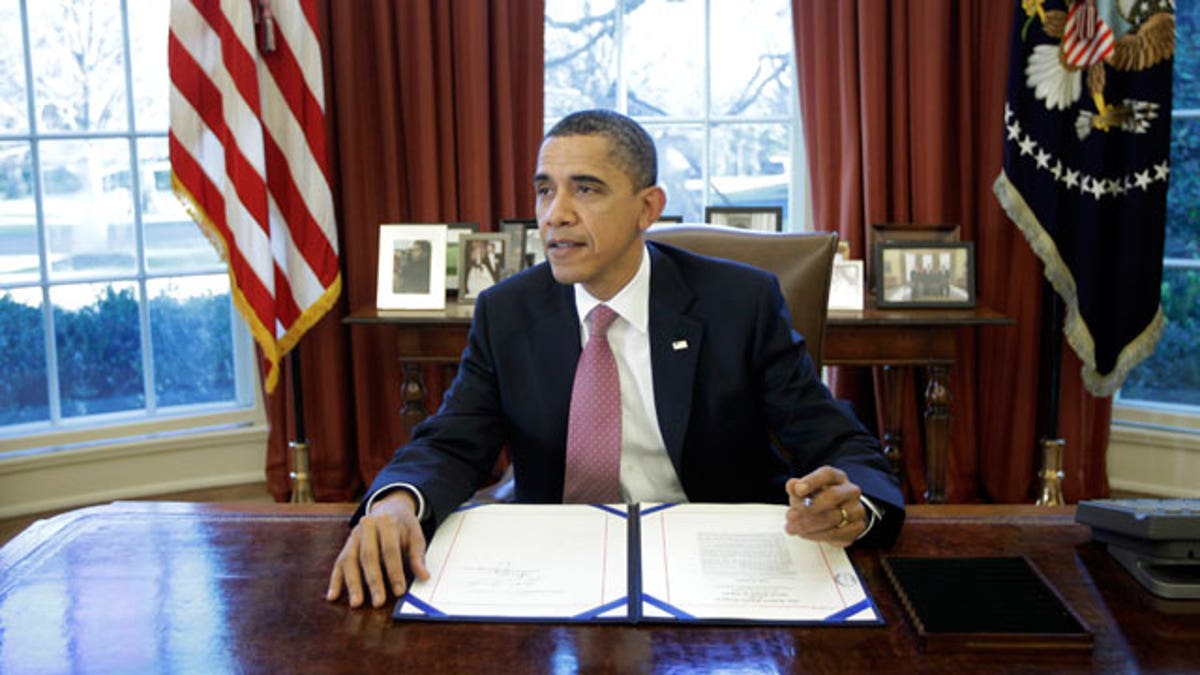
President Obama signs the two-week funding bill averting a government shutdown in the Oval Office at the White House in Washington, Wednesday, March 2, 2011. (AP)
A new, nonpartisan analysis of President Obama's proposed 10-year budget revealed Friday that the administration underestimated future deficits by more than $2 trillion.
In a preliminary report, the Congressional Budget Office (CBO) calculated, "In all, deficits would total $9.5 trillion between 2012 and 2021 under the president's budget." The Obama budget projected $7.2 trillion deficits over the same period.
Even more alarming, the CBO estimates that the "federal debt held by the public would double under the president's budget, growing from $10.4 trillion (69 percent of GDP) at the end of 2011 to $20.8 trillion (87 percent of GDP) at the end of 2021."
The biggest hole in the president's budget, according to the nonpartisan congressional number crunchers, was created by the two-year extension of tax cuts for all income brackets first passed under President George W. Bush, as well as a costly permanent fix for the Alternative Minimum Tax (AMT) to keep it from hitting more middle-income Americans. Congress has never been able to do this, however.
And the president also assumes higher tax rates for estates and gifts, though many in Congress oppose that plan. In all, revenue projections in the president's budget, when compared with the new CBO projections, are far rosier.
"Compared with the administration's estimates, CBO's estimates of the deficit under the president's budget are lower for 2011 (by $220 billion) but higher for each year thereafter (by a total of $2.3 trillion over the 2012-2021 period)."
Congress has been grappling for months with the budget, living on the precipice of a government shutdown, as a result. Republicans and some Democrats have pushed for major reductions in spending, but Democratic leaders have made it clear that they have hit a wall when it comes to pulling out more money from the discretionary side of the budget. Congress has, so far, approved $10 billion in reductions.
Senate Majority Leader Harry Reid, D-Nev., said Thursday, that bipartisan negotiations with the White House over a longer-term government funding bill to last through the current fiscal year, which ends September 30, include cuts to "mandatory programs," but it is not clear if that would include entitlement programs. Reid mentioned some cuts in the area of mandatory agriculture payments to farmers, as an example.
Bitter, partisan rhetoric has permeated the debate, at times, with GOP and Democratic leaders engaging in a blame game of which some have grown weary.
To that end, 64 rank and file members, both Republican and Democrat, fed up with two- and three-week stopgap spending measures to fund the government, sent a letter to the president on Friday urging him to engage in budget negotiations.
A bipartisan group of six of those senators has been working overtime to craft a compromise deficit reduction package that the rest of their 58 colleagues can support, using recommendations from the president's own fiscal commission which proposed $4 trillion in cuts to every corner of the budget, both mandatory and discretionary.
"Beyond FY2011 funding decisions, we urge you to engage in a broader discussion about a comprehensive deficit reduction package. Specifically, we hope that the discussion will include discretionary spending cuts, entitlement changes and tax reform," the letter states, adding, "By approaching these negotiations comprehensively, with a strong signal of support from you, we believe that we can achieve consensus on these important fiscal issues. This would send a powerful message to Americans that Washington can work together to tackle this critical issue."











































